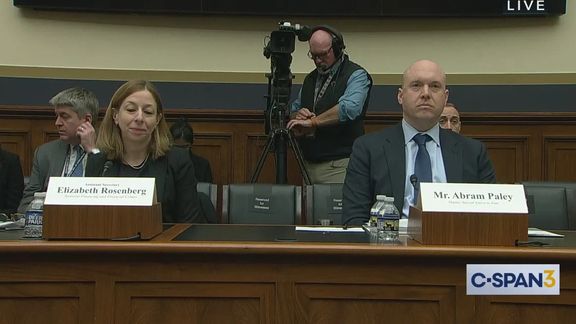US Lawmakers Grill Administration On Iran's Access To Funds

Abram Paley, the US Deputy Special Envoy to Iran, refused to answer a Congressional hearing Wednesday why his predecessor, Robert Malley, has been suspended.

Abram Paley, the US Deputy Special Envoy to Iran, refused to answer a Congressional hearing Wednesday why his predecessor, Robert Malley, has been suspended.
Malley was placed on unpaid leave in April 2023, after his security clearance was withdrawn reportedly for mishandling sensitive information. US lawmakers have tried several times to gain information on why Biden’s top man on Iran lost his security clearance –all to no avail.
The latest hearing on Iran was held by the House financial services subcommittee on oversight and investigation. It was entitled Moving the Money Part 2: Getting Answers from the Biden Administration on the Iranian Regime’s Support for Terrorism.”
Abram Paley and Elizabeth Rosenberg, Assistant Secretary for Terrorist Financing and Financial Crimes, were the two officials testifying in the hearing.
They both confirmed that two transactions have been made from the Iranian funds held in Oman, which were made available to Iran when the US government renewed a sanction waiver allowing Iraq to pay Iran what it owes for imported electricity –reportedly up to $10 billion.
Congressman Bill Huizenga, chairing the hearing, asked if “any issues or problems” have been identified in the two transactions facilitated with the Iranian funds held in Oman. Rosenberg offered to answer “in a closed setting,” implying that the information requested was classified.
"We'll take that as a yes," said Rep. Huizenga.
Other Representatives present in the hearing expressed concerns over the fungibility of the funds made available to Iran, despite assurances by the Biden administration that transactions would only be allowed for humanitarian purposes, such as purchasing medicine or agricultural products.
“Biden’s Deputy Special Envoy to Iran insisted Iran is not to be trusted,” Rep. Dan Meuser posted on X after the hearing. “Yet, this Administration takes Iran at its word that they won’t use the billions of dollars in aid Biden is trying to give them to finance terror.”
Paley explained that the Iraqi sanction waiver has been in place for a long time to allow the country to meet its energy needs. “This is the 21st time it has been renewed,” he said. However, the waiver never allowed Iran to gain access to hard currencies in cash. Money never left Iraq and Iran could only use the funds to import humanitarian needs. For the first time, the Biden administration allowed the funds to go to Oman in June of this year.
Congressman Pete Sessions questioned the reasoning of the waiver and the choice of Oman as the custodian of the Iranian funds.
He said: “[Secretary of State] Blinken statement says France, Italy and Oman faced exceptional circumstances preventing them from significantly reducing their petroleum purchases from Iran… Oman has reserves 79.4 times its annual consumption… This secretary has chosen to fool the US Congress into believing significant and exceptional rather than providing the data and information.”
Paley was also grilled on the now infamous $6 billion released by the Biden administration in September.
This is money from Iran’s oil sales that was blocked in South Korea but was released and transferred to Qatar to help release five Iranian-Americans held hostage in Iran. After Hamas’ October 7 attack on Israel, US officials announced that Iran would not be allowed to access the money “any time soon.”
Paley was repeatedly asked to confirm that the Iranian regime has not had access to this fund. “Not one penny has been spent,” he said.
But Rep. Dan Meuser pressed Paley on this point, enquiring whether the hold on the $6 billion was permanent. Paley couldn’t give a straight yes or no answer. So the statement should really be “not one penny has been spent –yet”, Meuser concluded.
Towards the end of the hearing, Congressman Zach Nunn focused on Iran’s oil exports, noting that there’s been a significant increase in the regime’s revenue –that would be used to fund terrorism, he said.
Neither Rosenberg nor Paley managed to explain the rocketing of Iran’s oil revenue in spite of numerous restrictions imposed by a multi-layered sanctions regime.
Rep. Nunn asked about particular steps taken by the Biden administration to address this –including taking action against those facilitating the exports in the shipping industry. Yet again, neither officials could provide a clear answer.
“Mr Paley, I would like a listing of all the actions that have actually resulted in reduction of oil flow out of Iran into terrorist groups,” Rep. Nunn said in the end, demanding a written answer following the hearing.
The issue of Iran’s oil exports using “ghost fleet” was discussed at length in another hearing on Tuesday, entitled Restricting Rogue-State Revenue: Strengthening Energy Sanctions on Russia, Iran, and Venezuela.